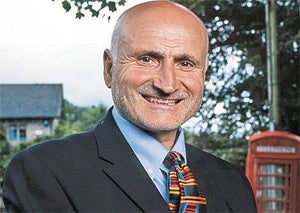Last Night's Television: Dolce Vito – Dream Restaurant, BBC2<br/>Off The Hook, BBC3<br/>The Love of Money, BBC2
Slim pickings at the end of the road

It all started so well for Dolce Vito – Dream Restaurant: food, drink, Italian countryside, and a barmy but lovable protagonist in the form of Vito himself. A few weeks in, though, things were wilting. His plans for a Modena restaurant fell through, as did his hopes for one in Florence, and then in Benevento. Vito's energy began to veer towards the manic end of the scale. A kilt appeared, the faux how-will-he-get-through-this-week's-catastrophe became a bit too, well, faux – and, somewhere along the line, I tuned out.
Last night, I thought I'd pay him one final visit, for old time's sake. After all, it was the final episode. And look, there he stood, in his smart new restaurant in – what's that? – Bologna? Looked like a few more plans changed along the way. He has named the place Passion, a perplexing (ironic?) choice given the British-themed menu. At any rate, it all looked very nice indeed: airy halls, high ceilings, pretty polished tables and chic European table-clothes. Just the sort of place you want to tuck into fish and chips. But, it was opening night, and – décor aside – the ingredients weren't looking good. Actually, the ingredients themselves were rather nice (posh cheese, salmon, beef etc) – but everything else was a recipe for disaster. The menu read like a 1970s dinner party: prawn cocktail, bangers and mash and cheescake. Inexplicably, Vito had eschewed a "soft" opening in favour of a full-on ceremony, complete with press, VIPs and critics. The only problem is that no one had been able to access the kitchen until the day before, so the head chef was forced to teach his army of Italian chefs the English cuisine overnight. Helpfully, he didn't speak Italian.
Would he pull it off? Or would it all fall apart? Oh, the tension! In the event, it seemed to go smooth ly (thanks in large part to the gallons of Scotch Vito had shipped in). "It's just like Italian food," grinned one (possibly intoxicated) guest. The newspaper critics were less vocal, though Vito was not shy of trying to influence them. "What are you going to tell your newspaper?" the TV crew asked one, shoving a camera in his face. "Uh, that it was very good," he grinned nervously. Before long, Vito's making speeches and proposing to his fiancée. "But we're already engaged!" she giggled, nervously. "Just tell me you'll marry me," boomed Vito. "Er, ok then..."
After last week's pulse-setting introduction, perhaps part two of the BBC2's The Love of Money series was always going to be a disappointment. In fairness, this segment, The Age of Risk, which examined the boom decades before the 2008 crash, was no less comprehensive than last week's instalment – just rather less thrilling. It took us through the rise of the neo-liberal orthodoxy of the 1980s, through its adoption by New Labour in the 1990s, and on into the housing boom of the Noughties, the explosion of the Chinese markets and the plunging interest rates that followed 9/11. In contrast to the 24-style account of Lehman Brothers' demise, this was a more conventional documentary, part analysis, part narration.
By far the most impressive aspect was the calibre of interviewees: Hector Sants of the Financial Services Authority and Nigel Lawson, but also Gordon Brown (again, cutting a far more impressive figure than we're accustomed to seeing these days), Alistair Darling, Mervyn King and, most impressive of all, Alan Greenspan, seemingly still struggling to come to terms with the markets' fallibility. Roland Amali provided this week's villain. The "father of sub-prime", he founded Ameriquest, the first of the indiscriminate brokers, rewarded by George Bush with a plum job as US ambassador to the Netherlands and then by his clients with hundreds of millions of dollars worth of lawsuits – small consolation to those still paying the price of his ideas.
Next week is the last in the series, Back from the Brink. It promises to explain "how close the world came to the brink of a total economic collapse" and talk to "the key players about how they battled to prevent a new Great Depression." It sounds like just the sort of thing the Prime Minister's advisers should be watching before they start planning the election. Whether or not they will is another question. I, on the other hand, will certainly be tuning in.
As for watching a third instalment of Off the Hook, well, things don't look promising. Last night was little different from the previous offering, except that our four heroes have been moved out of their grotty off-campus accommodation and into the more civilised confines of the student halls (which, I suspect, are considerably plusher than the average university digs). There's still the nightmare neighbour, the hot girl that everyone wants (different name, same role), and the end-of-episode party-that-goes-wrong. It's not that it is unfunny per se – there is the odd laugh courtesy of Shane, the best friend most people would give their eyeteeth not to have. And it's terribly well intentioned. But – and I feel slightly cruel saying this – it's just a little lame.
a.jarvis@independent.co.uk
Join our commenting forum
Join thought-provoking conversations, follow other Independent readers and see their replies
Comments